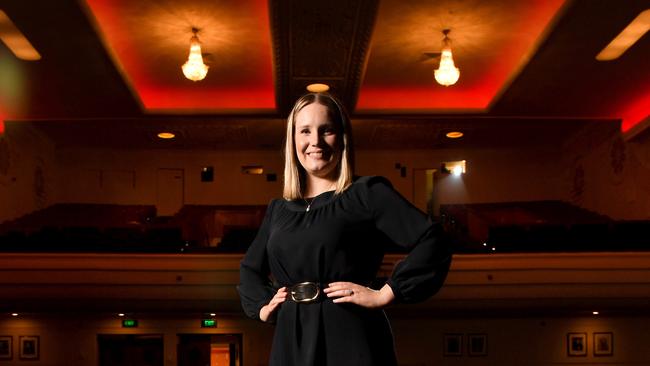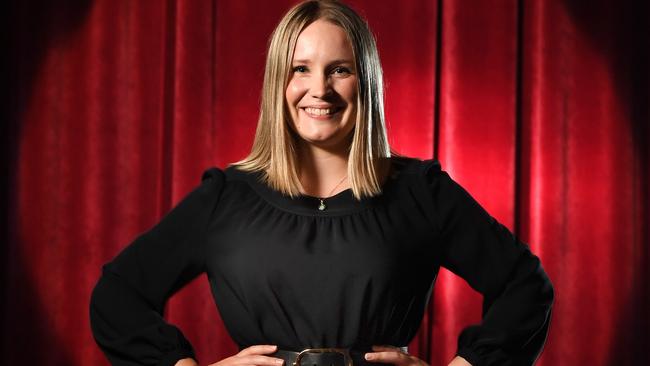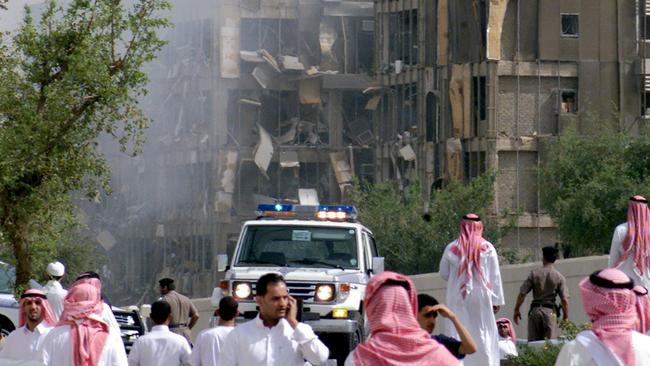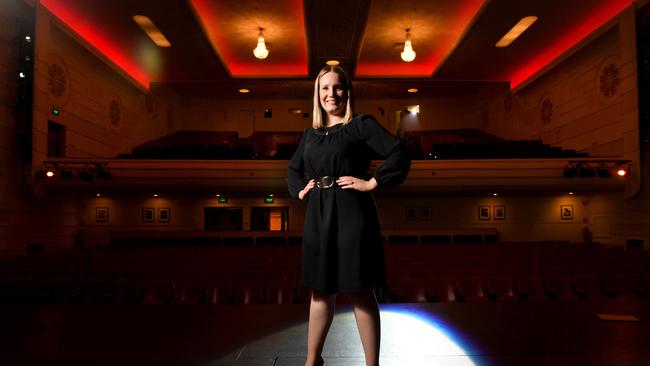Laura Curran’s journey from witness protection program to SA’s next Liberal Legislative Councillor
From hiding in witness protection to avoid murderous bikies to living in Saudi Arabia, aspiring Liberal MP Laura Curran has an extraordinary story to tell.

SA Weekend
Don't miss out on the headlines from SA Weekend. Followed categories will be added to My News.
There are some events that are always going to be imprinted on your memory. Even if you are only five years old. For Laura Curran it was the night she was taken into witness protection.
“Leaving the police station in the middle of the night with a convoy of police cars going to a safe house. That’s obviously stuck with me,’’ Curran says.
This was 20 years ago, not that long really. Curran is now 24. She has packed a lot into her short years. She moved to Adelaide, a place she had never been, from Saudi Arabia when she was 18 and is now likely to be elected to state parliament next year as a Liberal Party Legislative Councillor.
Curran was living in Queensland when she was put into witness protection. Her father had been an undercover cop. He’d helped put bikies, drug dealers and murderers in prison. He even helped convict a serial killer. But he’d become burnt out. The stresses and strains of living a double life in such a volatile and dangerous environment had taken a heavy toll. He left the cops, taking the family to Queensland in search of a fresh start.
It was a couple of years later when the phone call came. Curran was at home sick that day, but had a ballet recital in the evening.
“My dad received a phone call during the day to notify our family that we needed to get to the police station urgently. To start with, he thought the person on the phone was pranking us,’’ Curran says.
But not for long.
“He grabbed my hand and ran so fast to the car my feet couldn’t touch the ground.’’

Curran remembers the night in the police station clearly. The sights, the sounds, the feeling of being “terrified’’. Of police officers trying their best to distract the scared little girl by teaching her to whistle and click her fingers.
“I remember him (Dad) saying some really bad people are trying to hurt our family and trying to explain to us why we would be with the police for a little while. Trying to get my mum and my sister to come to the police station,’’ she says. “I still remember being on a balcony with Dad in the police station and him very heavily smoking cigarettes, stress smoking.’’
The late-night convoy followed. Whisking the family to a safe house. Even all these years later, Curran is not allowed to say where the house was or even what it looked like. The risk has not entirely passed. SA Weekend was asked not to reveal the names of Curran’s parents and sibling, where they live or where they work.
Naturally, the family’s life was immediately up-ended. Curran never returned to that house, she left behind school, never said goodbye to friends.
“Dad went back to get clothes and that was it,’’ she says.
When you are only five anything can become relatively normal. That’s your life and you live it. But Curran remembers feeling anxious every time she left the safe house. For years she experienced nightmares.
“You pick up on how tense everyone around you is,’’ Curran remembers. “They are obviously not telling you every single detail daily and giving you a report. But kids are smart enough to pick up on what is happening.’’

Her father had joined the police as a 22-year-old. He worked uniform for six years before moving into undercover work. Infiltrating bikies posing as a drug dealer involved immersing himself entirely in that world. To do otherwise was to risk exposure. After years undercover, he started to lose himself.
“I didn’t know who I was anymore. I didn’t know if I was a cop or a crook,’’ he told The Australian in a 2005 interview. “Combine the marijuana smoking with the enormous intake of alcohol and I was spending large parts of my working life bombed out of my brain.’’
It was a lifestyle for which he would pay a price. He left the police to start again. The family moved to Queensland where Laura’s father went to university to study engineering and her mother retrained as a teacher. But undercover life was not easy to leave behind. In that 2005 interview he talked about trying to end his life and battles with post-traumatic stress disorder.
His daughter watched her father try to piece his life back together. The witness protection lasted a few months before the family again moved, this time to Canberra. A location where they had few connections but would feel safe.
“We would go with Dad when he had his psychologist appointments, we would sit in the waiting room and play with marbles. That to me was my normal.
“I watched my parents have to…,’’ Curran starts before stopping. “Let’s just say I didn’t grow up with a silver spoon. I watched them struggle to make ends meet. I guess, work as a team to find a way forward and for Dad, what he went through personally. His personal struggles with PTSD and mum how she supported him.’’
It was an experience that could have blown any family apart. The PTSD made it difficult for her father to hold down a job, but Laura Curran says it actually made the family stronger. It is, she says, an “insular family unit”. “I have always been told growing up that you are not what happens to you. The way you respond to things that are out of your control, that is the thing you are in control of.’’
Her father pieced his life back together. His daughter calls him “tough” and “stubborn”.
When the family left witness protection, her father sent his CV to companies in the Middle East and Ireland, looking for an engineering job and figuring it might be best to leave Australia. He had no luck. But after a couple of years in Canberra, a call came from a company in Saudi Arabia offering him a job in developing major infrastructure projects.
“I just remember the excitement of my parents for the opportunity and then going to school and telling my teacher ‘I am not coming back next year I am moving to Saudi Arabia’. And her absolute shock.’’
Laura Curran was 12 when she moved to Saudi Arabia. The culture shock was total. Saudi Arabia is a hard line Islamic state. The family moved to Riyadh and lived in a western compound. There was no alcohol, no other religious worship permitted. Women were not allowed out on their own. Not allowed to drive. There were no cinemas. Music couldn’t be played in public. There were public beheadings.

They arrived not long after a series of bombings on western enclaves in Riyadh that had killed 39 people and injured another 180. Security was strict. Cars were checked for bombs, visitors had to be signed in and out. The compounds were heavily fortified.
“I looked out my bedroom window and I actually had a machine gun pit and tanks right across the road from me,’’ she says.
The life was lived within the compound. It had its own supermarket, pool and gym. There were outside trips to shopping malls and an annual trip back to Australia.
Curran says the Saudi people were “some of the most generous people you will ever meet’’ but it was a very conservative country. “When we moved to Saudi I think I felt more uneasy than I did in Australia just because it wasn’t a threat of witness protection, all of a sudden it became you had to watch what you say,’’ she says.
And what you wear and how you wear it. Saudi Arabia has a religious police force which enforces a strict interpretation of Islamic law, even on westerners. There was a day at a shopping mall where the kingdom’s religious police started shouting at the family. Curran thought it was because her mother had left her hair uncovered. It turned out the police were shouting at her. She was only 13.
“I had to quickly put my headscarf on and that was the first time it had dawned on me I was old enough to wear it.’’
There was no place for the usual teenage rebellions in Saudi Arabia.
“At the end of the day if you were rebelling it just didn’t impact you, it impacted your family, the business your family worked for, so for the most part most people were well behaved,’’ she says. “My parents made it very clear what the rules were early on and we respected that.’’
The tradition in Saudi, according to Curran, is that when you finish school “basically 24 hours after everyone gets on a plane and we all leave’’. And you don’t go back. No tourism to Saudi Arabia.
So, she had a choice. Curran was born in Sydney and had lived in Queensland and Canberra. But for university she decided Adelaide was where she wanted to study. It was a place she had never even visited.
So what was the attraction?
“I ended up picking Adelaide because of the Fringe Festival,’’ she says. Curran is a big fan of the arts and thought South Australia would be a good cultural fit.

But moving back to Australia from a closed society such as Saudi Arabia wasn’t always straightforward. Curran experienced something of a reverse culture shock.
“When I got off the plane in Adelaide and I am walking around by myself in Adelaide my heart was pounding because I just felt I was going to get in trouble,’’ she says.
That shock amplified as she was living in one of the university’s residential colleges.
“I am from an environment where there was no drinking, no fraternisation to living in a college where it’s the opposite,’’ she says. “It was a massive culture shock for me going from having to be so conservative and so reserved to having to get used to even music being played in public, which wasn’t allowed to happen in Saudi.’’
At first she found she didn’t really fit into Australian uni life. She struggled with homesickness.
“I found that quite a few people at uni were a lot more left leaning than I was and I was finding it difficult to find my place,’’ she says. “I can’t quite explain the feeling, you feel like a fish out of water for the first little bit.’’ Eventually she found her people when she hooked up with the Young Liberals and found they “shared the same kind of ideology’’. “That’s really when I felt at home here.’’
Given her background, it was natural for Curran to study law at university.
“Seeing what my parents went through, what my family went through, and I wanted to be able to make others people’s experiences a bit easier. For me going and studying law was also a part of understanding why what happened to me happened to me. ‘’
The interest in politics started at university. She says politics was discussed in the family home with her parents “making sure we understand why Australia operates the way it does’’. She says her parents are “traditional Liberal voters’’ and through watching “their work ethic, strength and determination in the face of adversity, that Liberal values were instilled in me.
“I learnt from a young age, through experience what my ideology is and especially in Saudi as well you witness first-hand what you are willing to accept and what you are not willing to accept.’’

Curran has worked as a staffer for Treasurer Rob Lucas and currently works for Senator Alex Antic, a leading figure of the party’s right wing. Curran was also president of the Women’s Council and last year condemned what she said was a “bullying” culture from some in the party that was driving women away from the Liberals.
“I have realised one of the reasons we have such poor representation in our parliament, is the culture of a few in this room,” she told the Council’s AGM. “As President I have received so many complaints from members about relentless bullying from other women in Women’s Council.”
Curran, who previously stood for election in the safe federal Labor seat of Kingston and the safe state Labor seat of Reynell, will be number four on the Liberal’s Legislative Council ticket at next March’s state election, meaning she is likely to be elected.
Federal Liberal MP Nicolle Flint says Curran has “had more life experience in her short 24 years than most people have had in a lifetime’’.
“She is brave which comes from living what she has lived through. She has had to be very tough from a young age.”
Flint lauds Curran for being “unfailingly polite’’ and says her nomination to the state’s parliament after only six years in the state is a testament to her “extraordinary work ethic’’.
Curran says she decided to put her hand up for representative politics because both her and her partner Cameron found it was difficult to find jobs in the law in Adelaide. They were contemplating moving interstate, but Curran says she had already moved so much in her life, she didn’t want to have to uproot and start again. Besides she liked living in Adelaide.
She and Cameron are in the process of building a new house, and she says housing affordability and stamp duty are important issues. Given her own experiences growing up she also believes we need to do more to help those with mental health issues and better services for police officers and their families.
“I learned from a young age what fear is. But more importantly, I also learned from a young age what resilience and strength are.’’




